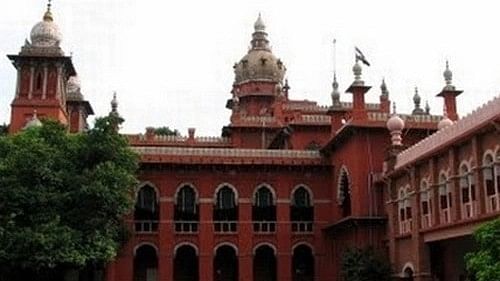
The Madras High Court.
Credit: PTI File Photo
Chennai: The Madras High Court on Wednesday set aside a single judge’s order quashing the breach of privileges notice issued in 2017 to 18 DMK MLAs by then Tamil Nadu Assembly Speaker P Dhanapal, including incumbent Chief Minister M K Stalin, for bringing gutkha sachets to the House.
The division bench of justices S N Subramaniam and C Kumarappan also referred the matter back to the Speaker and the Privileges Committee to proceed further.
The notices were issued after Stalin, the then Leader of Opposition, and 17 MLAs brandished gutkha sachets inside the assembly in protest against the then AIADMK government’s “inaction” over punishing the guilty in the gutkha scam in which former health minister C Vijayabaskar and then Chennai Police Commissioner T K Rajendran are arraigned as accused.
The DMK leaders, protesting the Speaker’s action of issuing privilege notices against them, moved the Madras High Court whose judge quashed the notices in 2020. However, the Assembly secretary moved the court against the order.
After the DMK came to power in 2021 overthrowing the AIADMK, the Assembly Secretary made a U-turn by maintaining that the appeals have become infructuous since the previous Assembly has been dissolved.
Advocate-general P S Raman also took a similar stand and argued that the privileges notices were part of a plan to safeguard the then AIADMK government led by Edappadi K Palaniswami, which was surviving on a wafer-thin majority.
However, the division bench said on Wednesday that privilege notices do not expire and referred it back to the House, while adding that the proceedings have not reached finality.
“Undoubtedly, setting aside the 'SCN' (show cause notice) issued by the Privilege Committee of the Tamil Nadu Legislative Assembly would set a bad precedent and result in opening of an avenue to many similarly placed persons to challenge 'SCN' relating to breach of privileges of the House by way of writ petition before the high courts,” the judges wrote.
They also disagreed with the single judge bench and maintained that the privileges and the powers of the Speaker would not lapse merely on account of a change of government.
“The notice issued by the Privilege Committee is related to disciplinary affairs of the House. Therefore, the proceedings will not lapse merely for the reason that the opposition party turned out to be the ruling party. The nature of proceedings requires a decision to be taken on merits by following due process contemplated under the Assembly Rules,” they added.